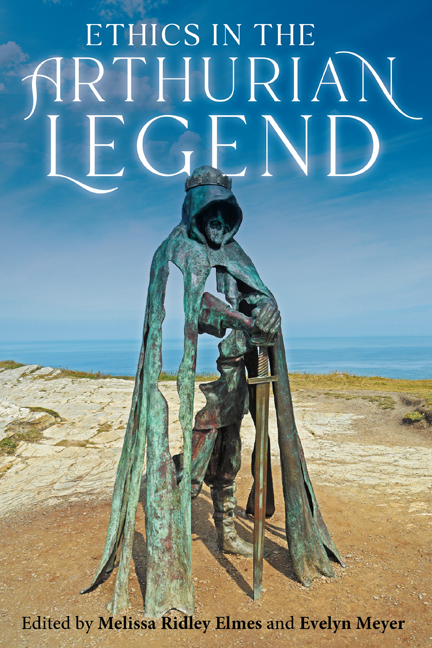Book contents
- Frontmatter
- Contents
- List of Contributors
- Foreword
- Acknowledgments
- Introduction
- 1 Arthurian Ethics before the Pentecostal Oath: In Search of Ethical Origins in Culhwch and Olwen
- 2 Too Quickly or Not Quickly Enough, Too Rash and Too Harshly: The Arthurian Court’s Lack of Ethics in Hartmann von Aue’s Erec and Iwein and Wolfram von Eschenbach’s Parzival
- 3 The Ethics of Arthurian Marriage: Husband vs Wife in Hartmann von Aue’s Iwein
- 4 Arthurian Ethics and Ethical Reading in the Perlesvaus
- 5 Translation Praxis and the Ethical Value of Chivalry in the Caligula Brut
- 6 Imperial Ambitions and the Ethics of Power: Gender, Race, and the Riddarasögur
- 7 Lowland Ethics in the Arthur of the Dutch
- 8 Contesting Royal Power: The Ethics of Good Lordship, Sir Gawain and the Green Knight, and the March of Wales
- 9 “As egir as any lyoun”: The Ethics of Knight-Horse Relationships in Lybeaus Desconus
- 10 Malory’s Ethical Dinadan: Moderate Masculinity in a Crisis of Hypermasculine Chivalry
- 11 Virtus, Vertues, and Gender: Cultivating a Chivalric Habitus in Thomas Malory’s Tale of Sir Gareth
- 12 Kingly Disguise and (Im)Perception in Three Fifteenth- Century English Romances
- 13 “Adventure? What is That?” Arthurian Ethics in/and the Games We Play
- 14 The Ethics of a New Edition of Sir Thomas Malory’s Le Morte Darthur – and More Evidence for the Superiority of the Winchester Manuscript
- 15 The Ethics of Writing Guinevere in Modern Historical Fiction
- Afterword
- Index
8 - Contesting Royal Power: The Ethics of Good Lordship, Sir Gawain and the Green Knight, and the March of Wales
Published online by Cambridge University Press: 10 January 2024
- Frontmatter
- Contents
- List of Contributors
- Foreword
- Acknowledgments
- Introduction
- 1 Arthurian Ethics before the Pentecostal Oath: In Search of Ethical Origins in Culhwch and Olwen
- 2 Too Quickly or Not Quickly Enough, Too Rash and Too Harshly: The Arthurian Court’s Lack of Ethics in Hartmann von Aue’s Erec and Iwein and Wolfram von Eschenbach’s Parzival
- 3 The Ethics of Arthurian Marriage: Husband vs Wife in Hartmann von Aue’s Iwein
- 4 Arthurian Ethics and Ethical Reading in the Perlesvaus
- 5 Translation Praxis and the Ethical Value of Chivalry in the Caligula Brut
- 6 Imperial Ambitions and the Ethics of Power: Gender, Race, and the Riddarasögur
- 7 Lowland Ethics in the Arthur of the Dutch
- 8 Contesting Royal Power: The Ethics of Good Lordship, Sir Gawain and the Green Knight, and the March of Wales
- 9 “As egir as any lyoun”: The Ethics of Knight-Horse Relationships in Lybeaus Desconus
- 10 Malory’s Ethical Dinadan: Moderate Masculinity in a Crisis of Hypermasculine Chivalry
- 11 Virtus, Vertues, and Gender: Cultivating a Chivalric Habitus in Thomas Malory’s Tale of Sir Gareth
- 12 Kingly Disguise and (Im)Perception in Three Fifteenth- Century English Romances
- 13 “Adventure? What is That?” Arthurian Ethics in/and the Games We Play
- 14 The Ethics of a New Edition of Sir Thomas Malory’s Le Morte Darthur – and More Evidence for the Superiority of the Winchester Manuscript
- 15 The Ethics of Writing Guinevere in Modern Historical Fiction
- Afterword
- Index
Summary
Postcolonial theory has opened up new spaces and possibilities for interpretation in many disciplines, including medieval studies. One text that has received a considerable degree of such attention in the last twenty years is the fourteenth-century alliterative poem, Sir Gawain and the Green Knight. In this viewpoint, the narrative justifies English colonialism through Arthur over Welsh subjects like Bertilak/ The Green Knight, wherein ‘Welshness’ signifies barbarity, treachery, and monstrosity. In this approach, it is often taken for granted that when the poet describes the land Gawain is venturing through as being infested with various monsters, he is describing Wales, and suggesting that Welsh people are barbaric. And yet, as other scholars have pointed out, Hautdesert is not located in Wales at all. One consequence of this postcolonial framework is that it can posit a unified, top-down colonizer/ colonized framework that does not manifest clearly in the poem, and has the implication of obfuscating the contests of lordly power that the poem is invested in. In this essay, I suggest we can more productively examine the political ethics of lordship at the heart of the poem by situating it in the context of the March of Wales, a fluid, and multicultural border region commanded by lords with considerable autonomy, wherein the writ of the king of England did not hold sway. Such Marcher lords could be antagonistic toward royal lordship, particularly when it encroached upon their customary rights. In attending to this unique context, we shall see that in the poet's framing of Bertilak as a Marcher lord, Sir Gawain and the Green Knight draws our attention to Bertilak/The Green Knight's good lordship and his regal qualities. In positioning Bertilak/The Green Knight in this way, the poet reveals the political ethics of lordship through his confrontation with Arthur and his interactions with Gawain, which illustrates the often-conflicted relations between Marcher lords and English kings in the later Middle Ages.
Ethics of Lordship, Marcher Demesnes, and Royal Overreach
While lordship in the Middle Ages was exploitative as a matter of course, medieval people understood the difference between good lordship and bad lordship.
- Type
- Chapter
- Information
- Ethics in the Arthurian Legend , pp. 173 - 197Publisher: Boydell & BrewerPrint publication year: 2023



